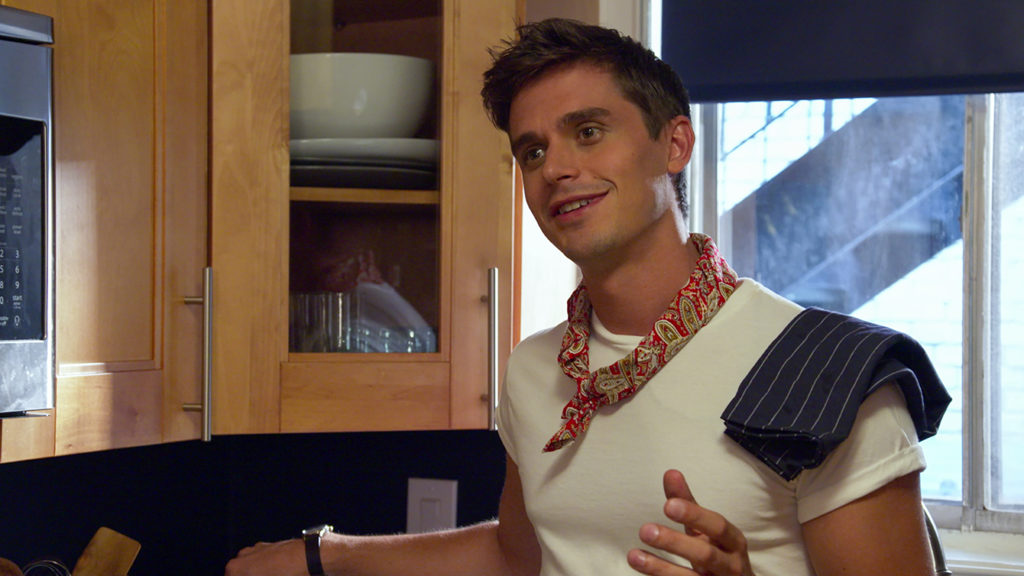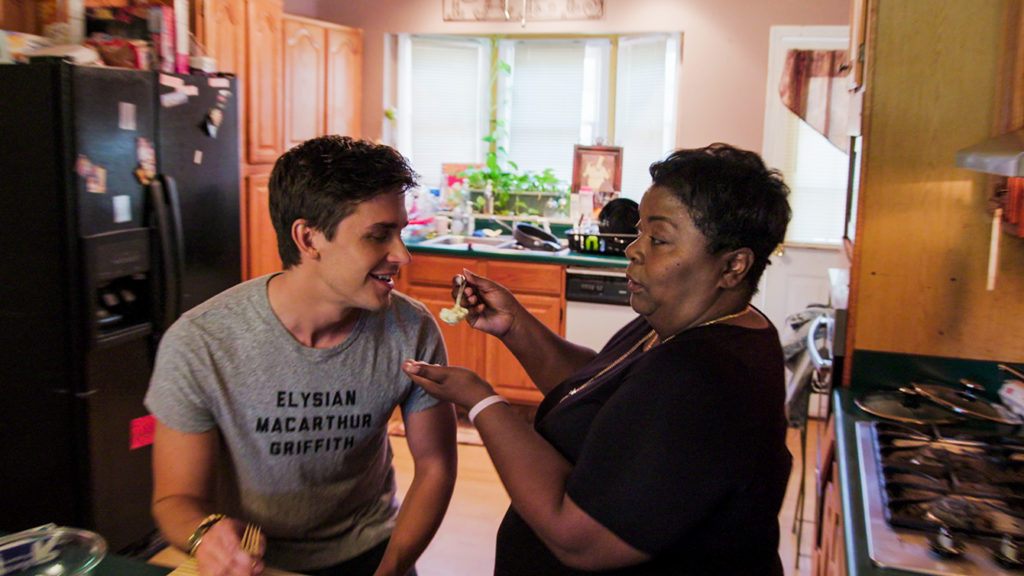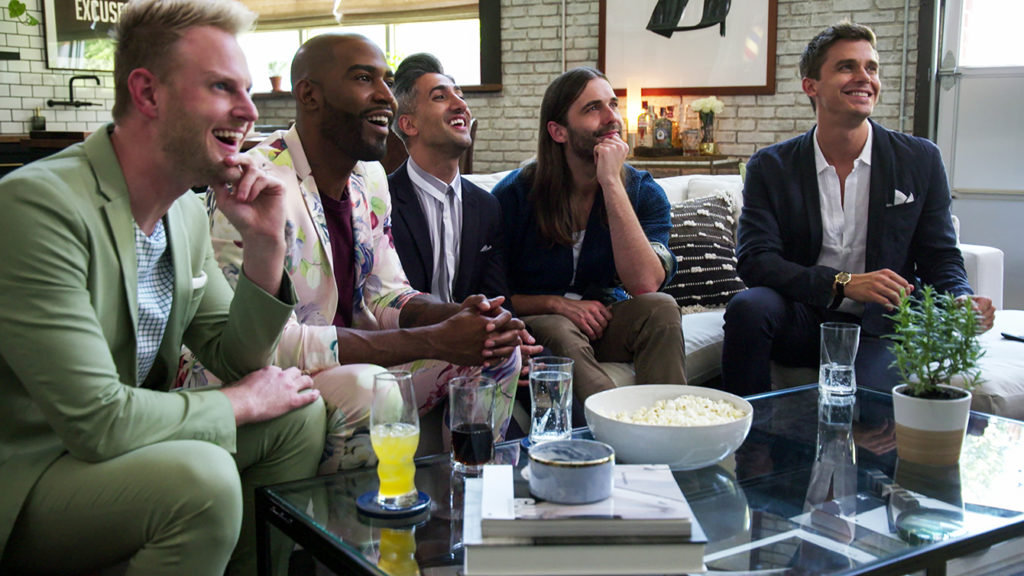
Netflix’s Queer Eye reboot has taken the world by storm and this month, it’s back with a new season. Viewers have been overjoyed with the return of Jonathan, Bobby, Tan, Karamo, and of course Antoni Porowski—the show’s food and wine expert. Whether he’s whipping up a fresh batch of guacamole, effortlessly sporting a band tee, or exploring the contents of a fridge, Antoni is an expert at forming personal connections with makeover contestants while imparting culinary wisdom. We chatted with Antoni about the unifying quality of food, being part of the Fab Five, and what Pride means to him.
Did you watch the original Queer Eye?
“I did. My older sister was obsessed with the show and watched it religiously, so I would peak in as she watched. I was so intrigued by these five guys running around New York City getting the best of everything and helping people out. It was a very fun show and I’ve always had a fascination and love affair with New York, so that really tied me in as well.”
Do you draw any inspiration from the show’s previous food and wine expert, Ted Allen?
“Sometimes whether I like it or not, because I’m in direct communication with him very often. I worked for him for two years, so I initially thought I was going to call him for advice, but it’s more him reaching out to me and giving me unsolicited advice and sending me articles about what’s going on.”
Are there any Ted Allen moments from the show that have stuck with you?
“There was one thing in particular—I think it’s the best scene he’s ever done. He was teaching this handsome model how to make ravioli for his girlfriend, so he goes to an Italian cheese monger in downtown New York. They start talking about the loss of certain cultural traits when immigrants move to a new country, and the cheese monger tells him that the first thing people lose when they move to a new country is their clothes, the second is their language, but the last thing to go is food—food is a constant, it tends to stay. Even with Italian-American cuisine, which is different than Italian, it still has a lot of similarities—it’s something that always sticks.
If I speak to people who have a mildly Polish name, they don’t know the language but they’re like, “My babcia (which is “grandma” in Polish) would make pierogies I remember,” and their eyes light up when they talk about the little part of themselves that they don’t necessarily know much about but is very nostalgic. It takes them back to a time in childhood when they were innocent little lambs and their grandmas were feeding them on the kitchen table.”

What was your favourite part about filming Season 2?
“We were based in Atlanta but we would go to small towns as well, and I loved the feeling of when you’re leaving a metropolis and everything just gets more green. You’re entering nature and even though its sweltering Atlanta summer heat, it’s still green and smells like a fresh cut lawn or that smell of hay and fields. It reminds me of being a kid and taking trips with my family where we would leave the city and enter the country—I just love that sensation.
Also, the sense of discovery in entering somebody’s home on the de-straightening day, which is probably my favourite day of the week, although it’s my compadres’ least favourite. I love rummaging through things and putting weird clothes on and touching and smelling things—it’s an exploration where I get to feel like a little kid again.”
Did you encounter any challenges that surprised you while filming this season?
“We’re all type A’s and we all take up a lot of energy and space—some of the guys are a little louder and more outward than others. If other people are type A’s or extroverts around me, I don’t compete for energy—not to say that they do—but I tend to shut down and just listen. For me, what I learned was just to have faith in what I say and when I want to say it, and not say something unless I really have a point or that I can stand behind—not just to take up air. It’s been a confidence building exercise, which I’ve really been enjoying.”
What are the major differences from Season 1 that viewers can expect to see in the new episodes?
“We have our first woman, and we get to explore more in terms of inclusivity. We help our first trans person, which was eye opening to so many of us. Even from an editing standpoint, they got into our personal backstories a little more, which has been really great, and through simple little tidbits and meme fodder, you get to see some of our little tweaks and mannerisms that really make us us, which I think is going to be a lot of fun for fans.”

Did you learn anything about yourself in the process of helping others?
“Yeah, it’s completely re-evaluated how I want to go about my life and the type of work that I want to do. Everything prior to the show was all just me, me, me—not to say that I’ve become some kind of a Mother Teresa as a result—but I’m definitely more cognizant and aware of the fact that the most gratifying work I’ve ever done has been on this show when I’m helping others.
Visibility is a word that’s been coming up recently and I never really understood it. Sometimes I get kind of embarrassed if somebody’s like, “Oh my gosh you talking about your coming out or just you being on the show, I love it!” and they have a very strong emotional response, or they say something like, “I love you!” I didn’t understand it for a while and thought, “It’s impossible! You don’t know me and I haven’t done anything.” This is a job and I just show up—we have a mission and we accomplish it. I try to figure out how to teach someone how to make something to eat and I laugh with my buddies. But I think being under the LBGTQIA+ umbrella, just showing up and being the truest version of myself, that actually helps people.”
What does Pride mean to you?
“For me, I look at it idealistically—what I want pride to be for everyone is to be able to express themselves in whatever field or makeup or mannerism or affect or accent or behaviour that they want to engage in, and to be able to do so freely, and to be appreciated and feel safe in doing that. To not be jailed or ostracized or killed or judged or insulted for wanting to be whoever the hell they want to be and living however they want to. Having that freedom to be in a safe space without judgment.”

